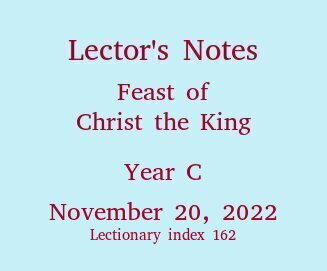

Feast of Christ the King, November 23, 2025
This describes the choosing of Israel's second king, the great David. His successful 40-year reign became the model for the hoped-for Messiah (that is, anointed one) in later Judaism.
Some ancient peoples believed in complex hierarchies of angels, demigods and other spirits, mediating between humanity and God. Paul, without saying whether these exist or not, asserts that Christ is superior to them all.
The old notion of Messiah was of a king after the model of David. To apply that title to Jesus required deep re-thinking of the royal model.
Our Liturgical Setting: In liturgical years B and C, the gospel on the feast of Christ the King comes from a passion narrative, where the contrast between Jesus' way of being King and earthly kingship is most stark. In today's gospel, the people are mocking Jesus over the title "Messiah." The first reading tells the origin of that title in our tradition, applying it to Israel's second king, David.
The Historical and Literary Situation: In the ancient Middle East, kings were ceremoniously given their office not by crowning but by anointing. The Hebrew word "messiah" literally means "anointed." David reigned from roughly 1000 BC to 960 BC, a successful "anointed" one under whom Israel flourished. Later, in harder times, Israel would summon up hope for a new anointed one, a Messiah like David. When Jesus came, he was of the family of David, and as just and pious as David at his best, but unlike royal David in most other respects, certainly in earthly powerlessness. So it was a bit of stretch when his followers gave Jesus the title "Messiah." (The Greek word "Christ" means anointed one, as the Greek word "chrism" names the oil used even today to anoint the baptized, the confirmed, and the ordained.) Ancient notions of what it meant to be a king had to be re-thought by those applying these categories to Jesus.
In the scene described in today's first reading, Israel's first king Saul is dead. There's no precedent for replacing him. David had been a successful military commander under Saul. This is what the text means when it says "It was you who led the Israelites out [led out our army on campaigns] and brought them back."
The Lector's Proclamation: When you read this and the following sentence, you're repeating words of desperate people imploring someone to take on a great responsibility. Sound persuasive! Say the final sentence with finality, "and they anointed him [pause] King of Israel."
This Reading in Liturgical Context: Interestingly, we read most of these verses only a few months ago, on the Fifteenth Sunday of Ordinary Time. In today's context, this illuminates Jesus' kingship from another angle. In earthly terms, as we saw in the gospel, he was anything but kingly. But in cosmic terms, Paul persuades us to rank him highest of all.
The Historical, Theological Origins of the Text: But why is Paul so emphatic? Among the early Christians at Colossae there were people promoting a detailed belief in angels and their mediating role in our relationship with God. Paul, neither affirming nor denying the existence of these "thrones, dominations, principalities or powers" simply states that Christ is superior to the whole lot. He'll reiterate this throughout the letter, and explain how our salvation comes through Christ alone. But today's passage is only about the superiority of the person of Christ.
Here in paraphrase are Paul's assertions about Christ:
Your Proclamation: So, as lector, deliver this piece as a polemic. Your listeners probably won't know the context, but they should know that Paul and you are emphatic and uncompromising about Christ's place in the universe, in all of history, and in your hearts. You might emphasize the gift of "redemption, the forgiveness of our sins," in verse 14, because it ties this reading to a theme in the day's gospel.
As of Tuesday, November 18, the Saint Louis U. links above are untested, and only the Karban, 2016, link below is updated. The chore of fixing the other Karban links is held up by Cloudfare server errors.
The erection of a statue of Christ the King in the town of Swiebodzin, Poland, in 2010. Click here for a BBC story about the event and the statue.
This page updated November 18, 2025